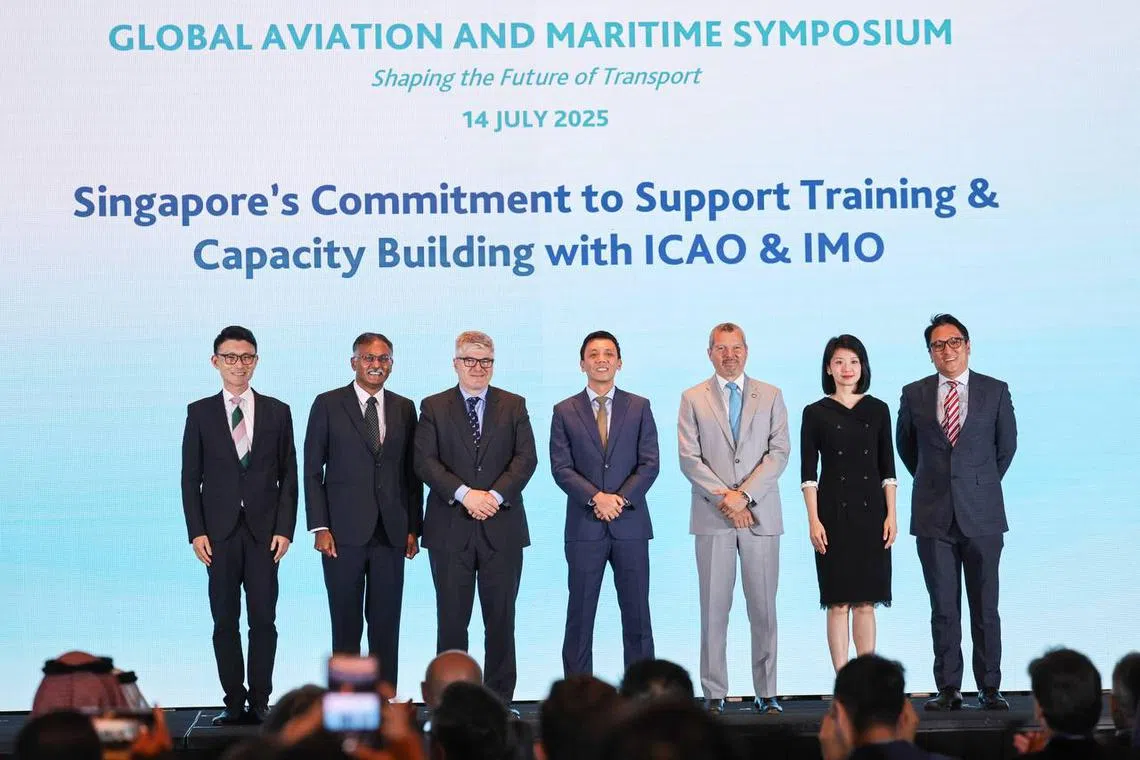Singapore to train more aviation and maritime officials from around the world
Sign up now: Get ST's newsletters delivered to your inbox

Acting Minister for Transport Jeffrey Siow delivers his speech at the Global Aviation and Maritime Symposium on July 14.
ST PHOTO: GIN TAY
Follow topic:
SINGAPORE – More aviation and maritime officials from around the world will be trained in Singapore, as the Republic launches and develops new training programmes in these two sectors.
The programmes support the International Civil Aviation Organisation (ICAO) and International Maritime Organisation (IMO), which Acting Transport Minister Jeffrey Siow said are examples of multilateral institutions that are “pillars of a rules-based international order”.
They are also among efforts to cement Singapore’s position as an aviation and maritime hub.
The training programmes include one for transport officials from the Small Island Developing States (Sids), comprising states in the Caribbean and Pacific islands, among others.
The programme will focus on the unique challenges that small island states, like Singapore, face in the aviation and maritime industries, Mr Siow said at the opening of the Global Aviation and Maritime Symposium.
The first training programme for Sids will be in 2026, for officials from the Caribbean island states. Courses for the Pacific island states and others are in the pipeline.
Mr Siow also said Singapore will work with ICAO and IMO on a new global initiative to develop and deliver specialised training programmes for officials and practitioners across both the aviation and maritime sectors.
The collaboration recognises “increasing interdependencies between the aviation and maritime sectors, and the common challenges they face”, he said.
Mr Siow also announced the extension of the Singapore-ICAO Developing Countries Training Programme, funding 330 fellowships and 10 scholarships valued at US$1.8 million (S$2.3 million) over the next three years. This is aimed at supporting officials from developing ICAO member states in attending aviation-related courses.
The Republic has also committed a second tranche of US$3 million to the Enhanced Technical Co-Operation and Training Package for IMO and its member states, said Mr Siow.
This is in addition to US$2 million previously committed for 2024 to 2025, which will support training for seafarers in areas such as alternative fuels, digitalisation and marine casualty investigations.
To date, Singapore has run aviation and maritime training courses for more than 1,800 participants under the Singapore-ICAO Developing Countries Training Programme, and over 2,400 participants under the Singapore-IMO Third Country Training Programme, Mr Siow said.
He said at the symposium that Singapore has been “a strong supporter” of ICAO and IMO since it joined both organisations in 1966, and served as a member of the ICAO and IMO councils since 2003 and 1993, respectively.
The event has brought the global aviation and maritime communities together for the first time, including the secretaries-general of ICAO and IMO.
ICAO and IMO ‘pillars’ in unpredictable world
Mr Siow said Singapore remains committed to working with ICAO and IMO.
“In an increasingly unpredictable global climate, multilateral institutions like the ICAO and IMO are pillars of a rules-based international order,” he said.
For example, their “clear, rules-based frameworks” allow the safe movement of people and goods by air and sea, even during crises.
And they provide “steadfast leadership” even in “periods of transition and turbulence”, serving as platforms for collective action and global cooperation, Mr Siow said.
To Singapore, “connectivity is existential”, he said. “We are a major aviation and maritime hub, connected to around 170 cities by air and over 600 ports across 120 countries.”
Singapore is also a hub for international travel and trade, and has invested in upgrading its airport and seaport, as well as air traffic and vessel traffic management systems, he added.
“Because of Singapore’s connectivity, we can see and feel first-hand how global trends are shaping aviation and maritime,” Mr Siow said.
These trends include “more fragmented and volatile” economic and geopolitical environments, resulting in rising costs and heightened uncertainty, he said. This has had knock-on effects on freight networks and port operations worldwide.
At the same time, consumer demand for transport is growing faster than capacity, Mr Siow noted. As passenger and cargo traffic by air and sea continue to grow, “countries are striving to build infrastructure and capability to meet the rising demand”.
The aviation and maritime industries are also grappling with longer-term issues such as climate change and technology, he added.
In his speech, Mr Siow said two challenges that both industries must tackle are safety and sustainability.

(From left) Minister of State Baey Yam Keng; Senior Minister of State Murali Pillai; ICAO Secretary-General Juan Carlos Salazar; Acting Minister for Transport Jeffrey Siow; IMO Secretary-General Arsenio Dominguez; Senior Minister of State Sun Xueling; and Permanent Secretary Lau Peet Meng in a group photo at the Global Aviation and Maritime Symposium in Raffles City Convention Centre.
ST PHOTO: GIN TAY
Safety the ‘foundation’ of aviation, maritime sectors
Maintaining safety has become more demanding as air and sea traffic grows and operating environments become more complex, said Mr Siow.
For example, airspace for flights is tightly regulated, and maritime vessels in open waters sail without central traffic control, relying on onboard navigation systems and local guidance near ports to ensure safe passage.
New technologies are being used in both sectors to improve operations, “but they also bring new risks”, Mr Siow noted, such as cyber security threats and system vulnerabilities.
“We must ensure that our people are well equipped to use these technologies safely, and make the right decisions even under pressure,” he said. “This is why training remains critical.”
As for sustainability, Mr Siow noted that the aviation and maritime sectors each contribute about 3 per cent of global emissions, adding that aviation and maritime decarbonisation must be balanced against economic development.
ICAO and IMO have adopted 2050 net-zero carbon emissions goals.
For aviation, the key is the adoption of sustainable aviation fuel, which can reduce emissions by up to 80 per cent, compared with fossil jet fuel on a life-cycle basis.
Importantly, sustainable aviation fuels can be used with existing aircraft engines and airport infrastructure.
This is not the case for the maritime sector.
While there are various alternative marine fuel options – such as liquefied natural gas, biofuels, methanol, ammonia and hydrogen – the availability of infrastructure for these fuels varies across shipping routes.
“The maritime community is therefore preparing for a multi-fuel future,” Mr Siow noted.
More than 500 delegates, including transport ministers, senior officials, regulators and industry leaders and experts from more than 80 countries, are in Singapore to attend the symposium, which runs until July 18.
At a press conference later on July 14, Mr Siow described Singapore’s aviation and maritime sectors as being “in a good place”.
“Singapore has been at the centre of flows for a long time – flows of people, flows of goods and services, flows of capital,” he said.
Despite its small size, it is “an important influencer” of global norms and practices.
Through its work with ICAO and IMO, Singapore can help to shape and invest in the development of both industries in the years to come, said Mr Siow.


